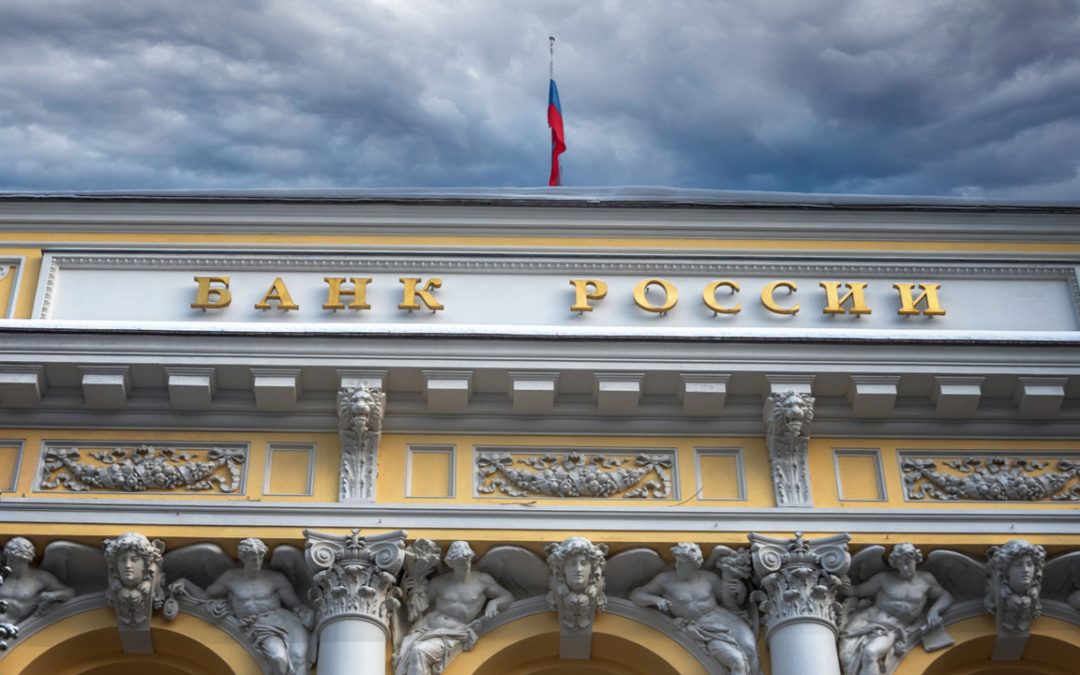Central Bank of Russia is now working with commercial banks in order to delay payments made to digital asset exchanges. The move aims to limit “emotional” cryptocurrency purchases made by “unqualified” Russian investors, a CBR official revealed. The move is likely to affect peer-to-peer and over-the-counter trading platforms.
Central Bank of Russia Skeptical of Cryptocurrency Investments
Bank of Russia remains skeptical about the acquisition of cryptocurrencies and will not support increasing access to crypto markets for Russian investors, most of whom are not accredited, the bank’s Deputy Chairman Sergei Shvetsov stated this week, quoted by Prime business news agency. Speaking at the “Banks of Russia – XXI Century” international banking forum, the high-ranking official elaborated:
When it comes to buying [cryptocurrency] for investment purposes, we are skeptical about this idea. We believe it’s different from traditional assets, it’s highly risky and has signs of a pyramid scheme.
Shvetsov reiterated the central bank’s “clear position” that the only means of payment in the Russian Federation is the “ruble in all its forms and not some kind of monetary surrogates or foreign currencies.” The financial authority is preparing to launch a digital ruble prototype by the end of the year and it hopes the CBDC will help curb the use of cryptocurrencies in Russia.
During the event in Sochi, Shvetsov said the Bank of Russia is cooperating with commercial banks in order to delay payments sent to cryptocurrency exchanges. The CBR recently recommended banks block cards and wallets used to transact with crypto exchangers. The goal is to limit chances for impulsive purchases of crypto assets, the regulator’s deputy head remarked. Quoted by RIA Novosti, the banker stated:
We are starting to work with the banking system so that it slows down payments in favor of exchange offices and cryptocurrency exchanges, fencing off opportunities for emotional purchases of this kind of products.
Sergei Shvetsov noted that despite some governments taking steps to legalize cryptocurrencies, concerns persist that this type of monetary system could collapse completely. “There is a high probability that, as a high-tech financial pyramid, all this can fall down to zero,” he warned, adding that there may be hundreds of reasons why this could happen. “From our point of view, this is a large minefield,” the central bank’s official stressed.
if (!window.GrowJs) { (function () { var s = document.createElement(‘script’); s.async = true; s.type=”text/javascript”; s.src=”https://bitcoinads.growadvertising.com/adserve/app”; var n = document.getElementsByTagName(“script”)[0]; n.parentNode.insertBefore(s, n); }()); } var GrowJs = GrowJs || {}; GrowJs.ads = GrowJs.ads || []; GrowJs.ads.push({ node: document.currentScript.parentElement, handler: function (node) { var banner = GrowJs.createBanner(node, 31, [300, 250], null, []); GrowJs.showBanner(banner.index); } });
CBR Restrictions to Violate Russians’ Rights, Legal Expert Says
Shvetsov’s comments have raised other concerns, however — those of people involved in the Russian crypto space. The very talk of imposing restrictions sends an extremely negative signal and the consequences could be catastrophic for the country’s crypto market, Nikita Zuborev, senior analyst at the popular exchange aggregator Bestchange.ru, told Forklog. He also warned:
The most affected segment will be OTC trading with registration in the Russian Federation – exchange offices and users of P2P platforms. Miners will also be forced to look for workarounds to keep farms in operation, selling the mined coins for rubles will be problematic.
According to Andrey Tugarin, Managing Partner at GMT Legal, limiting bona fide transactions for the purchase of cryptocurrencies would be illegal. “The current law ‘On Digital Financial Assets’ allows every citizen of the Russian Federation to own digital currency, which is bitcoin, buy or sell it and use it as an investment. And this right applies regardless of whether the buyer is a qualified investor or not,” Tugarin emphasized.
The good news right now is that in the past few weeks, Exmo, a popular cryptocurrency exchange in the region, has not registered any decline in the volume of deposits made by Russian users. In fact, Russian trades on the platform have actually increased during the recent market correction, revealed Maria Stankevich, Exmo’s chief business development officer.
Do you think Bank of Russia will manage to curb Russian cryptocurrency investments? Share your thoughts on the subject in the comments section below.














